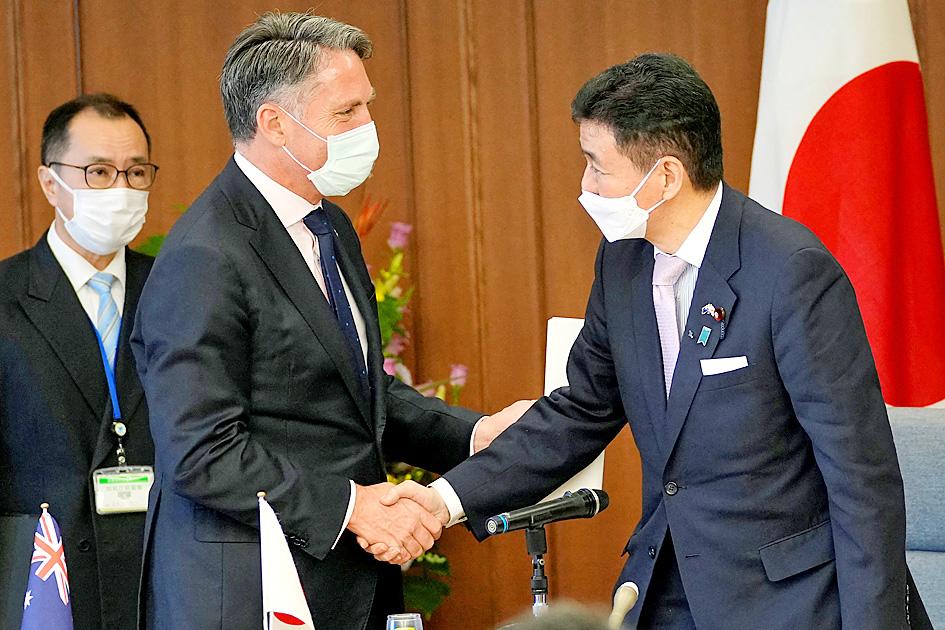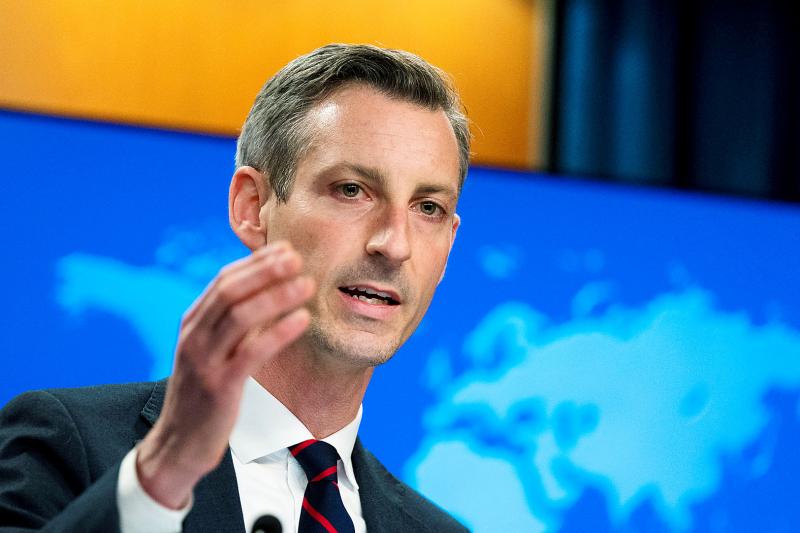The US on Tuesday backed Taiwan’s assertion that the Taiwan Strait is an international waterway, a further rebuff to Beijing’s claim to exercise sovereignty over the strategic passage.
On Monday, the Chinese Ministry of Foreign Affairs said the country “has sovereignty, sovereign rights and jurisdiction over the Taiwan Strait,” and called it “a false claim when certain countries call the Taiwan Strait ‘international waters.’”
On Tuesday, US Department of State spokesman Ned Price said in an e-mail: “The Taiwan Strait is an international waterway, meaning that the Taiwan Strait is an area where high-seas freedoms, including freedom of navigation and overflight, are guaranteed under international law.”

Photo: Reuters
The world has “an abiding interest in peace and stability in the Taiwan Strait, and we consider this central to the security and prosperity of the broader Indo-Pacific region,” he added.
Price reiterated US concerns about China’s “aggressive rhetoric and coercive activity regarding Taiwan,” and said the US “would continue to fly, sail and operate wherever international law allows, and that includes transiting through the Taiwan Strait.”
In Taipei, Premier Su Tseng-chang (蘇貞昌) yesterday said the Strait was by “no means China’s inland sea.”

Photo: Reuters
“China’s ambition to swallow up Taiwan has never stopped or been concealed,” he told reporters. “The Taiwan Strait is a maritime area for free international navigation.”
China’s Taiwan Affairs Office said that Taipei was “cooperating with external forces to hype up the issue.”
This “harms the interests of compatriots on both sides of the Taiwan Strait and betrays the interests of the Chinese nation — it is despicable,” office spokesman Ma Xiaoguang (馬曉光) said in Beijing.
In related news, Japan and Australia’s defense ministers yesterday vowed to step up their ties to support democratic values in the Indo-Pacific region, and agreed to work more closely with Southeast Asia and the Pacific island nations where China is seeking to expand its influence.
Australian Minister for Defence Richard Marles and his Japanese counterpart, Nobuo Kishi, said that regionwide cooperation is necessary to maintain and strengthen the rules-based order in the Indo-Pacific region, where there is growing fear that Russia’s invasion of Ukraine might embolden China to increase its assertiveness.
“It is clear that our region faces the most complex set of strategic circumstances we have had since the end of World War II and what the region does matters,” Marles told a joint news conference in Tokyo after holding talks with Kishi.
“Only by working together can we uphold the rules-based international order, contribute to an effective balance of military power and ensure our region remains stable, peaceful and prosperous,” Marles added.
Kishi said the two ministers shared their concerns about the impact of Russia’s invasion of Ukraine.
He said they remain strongly opposed to any unilateral change of the “status quo” in the East and South China seas, and reaffirmed their commitment to a mutual vision of “a free and open” international order of the seas.

SECURITY: As China is ‘reshaping’ Hong Kong’s population, Taiwan must raise the eligibility threshold for applications from Hong Kongers, Chiu Chui-cheng said When Hong Kong and Macau citizens apply for residency in Taiwan, it would be under a new category that includes a “national security observation period,” Mainland Affairs Council (MAC) Minister Chiu Chui-cheng (邱垂正) said yesterday. President William Lai (賴清德) on March 13 announced 17 strategies to counter China’s aggression toward Taiwan, including incorporating national security considerations into the review process for residency applications from Hong Kong and Macau citizens. The situation in Hong Kong is constantly changing, Chiu said to media yesterday on the sidelines of the Taipei Technology Run hosted by the Taipei Neihu Technology Park Development Association. With

CARROT AND STICK: While unrelenting in its military threats, China attracted nearly 40,000 Taiwanese to over 400 business events last year Nearly 40,000 Taiwanese last year joined industry events in China, such as conferences and trade fairs, supported by the Chinese government, a study showed yesterday, as Beijing ramps up a charm offensive toward Taipei alongside military pressure. China has long taken a carrot-and-stick approach to Taiwan, threatening it with the prospect of military action while reaching out to those it believes are amenable to Beijing’s point of view. Taiwanese security officials are wary of what they see as Beijing’s influence campaigns to sway public opinion after Taipei and Beijing gradually resumed travel links halted by the COVID-19 pandemic, but the scale of

A US Marine Corps regiment equipped with Naval Strike Missiles (NSM) is set to participate in the upcoming Balikatan 25 exercise in the Luzon Strait, marking the system’s first-ever deployment in the Philippines. US and Philippine officials have separately confirmed that the Navy Marine Expeditionary Ship Interdiction System (NMESIS) — the mobile launch platform for the Naval Strike Missile — would take part in the joint exercise. The missiles are being deployed to “a strategic first island chain chokepoint” in the waters between Taiwan proper and the Philippines, US-based Naval News reported. “The Luzon Strait and Bashi Channel represent a critical access

Pope Francis is be laid to rest on Saturday after lying in state for three days in St Peter’s Basilica, where the faithful are expected to flock to pay their respects to history’s first Latin American pontiff. The cardinals met yesterday in the Vatican’s synod hall to chart the next steps before a conclave begins to choose Francis’ successor, as condolences poured in from around the world. According to current norms, the conclave must begin between May 5 and 10. The cardinals set the funeral for Saturday at 10am in St Peter’s Square, to be celebrated by the dean of the College